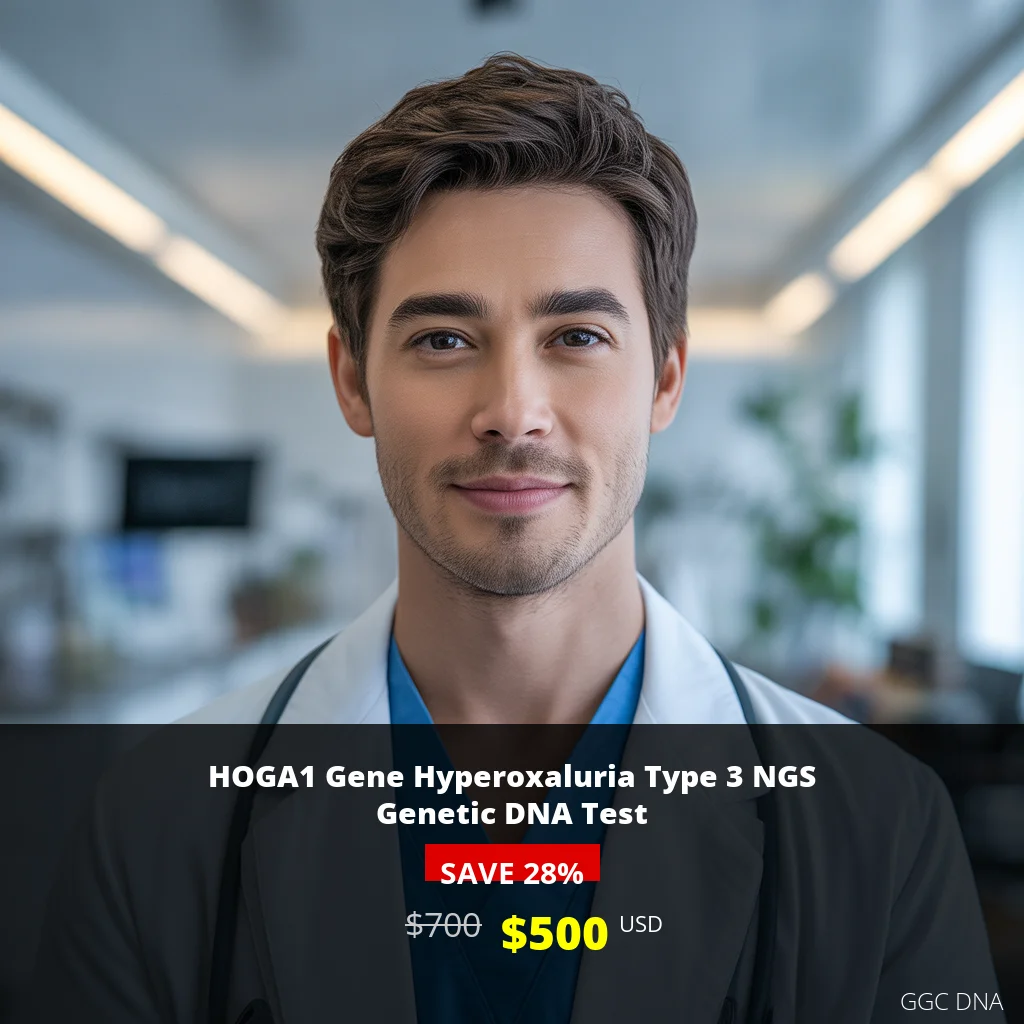HOGA1 Gene Hyperoxaluria Type 3 NGS Genetic DNA Test
Comprehensive Genetic Testing for Inherited Metabolic Disorders
The HOGA1 Gene Hyperoxaluria Type 3 NGS Genetic DNA Test represents a breakthrough in genetic diagnostics for rare metabolic conditions. This advanced testing methodology provides crucial insights into inherited disorders affecting oxalate metabolism, enabling precise diagnosis and personalized treatment approaches for patients experiencing recurrent kidney complications.
What is Hyperoxaluria Type 3?
Hyperoxaluria type 3 is an autosomal recessive genetic disorder caused by mutations in the HOGA1 gene, which encodes the mitochondrial enzyme 4-hydroxy-2-oxoglutarate aldolase. This enzyme plays a critical role in the metabolic pathway that breaks down hydroxyproline, an amino acid abundant in collagen. When HOGA1 gene function is impaired, the body accumulates excessive oxalate, leading to the formation of calcium oxalate crystals and stones in the kidneys and urinary tract.
What the Test Measures and Detects
Our comprehensive NGS-based genetic test specifically analyzes the HOGA1 gene to identify pathogenic variants responsible for hyperoxaluria type 3. The test examines:
- Complete coding regions of the HOGA1 gene
- Exon-intron boundaries for splice site mutations
- Known pathogenic variants associated with hyperoxaluria type 3
- Novel genetic variations with potential clinical significance
- Copy number variations affecting gene function
Using next-generation sequencing technology, we achieve exceptional accuracy in detecting even rare mutations that might be missed by conventional genetic testing methods.
Who Should Consider This Test?
Clinical Indications and Symptoms
This genetic test is recommended for individuals presenting with:
- Recurrent kidney stones, particularly in childhood or adolescence
- Family history of hyperoxaluria or unexplained renal disease
- Early-onset nephrolithiasis (kidney stones before age 25)
- Elevated urinary oxalate levels without clear secondary causes
- Progressive renal impairment with calcium oxalate crystal deposition
- Unexplained end-stage renal disease in young patients
- Consanguineous family background with renal complications
Benefits of HOGA1 Genetic Testing
Comprehensive Diagnostic Advantages
Undergoing HOGA1 genetic testing provides numerous clinical benefits:
- Definitive Diagnosis: Confirms or rules out hyperoxaluria type 3 with high accuracy
- Early Intervention: Enables proactive management before significant renal damage occurs
- Personalized Treatment: Guides targeted therapeutic approaches based on genetic findings
- Family Planning: Provides crucial information for genetic counseling and reproductive decisions
- Differential Diagnosis: Distinguishes between different types of primary hyperoxaluria
- Prognostic Information: Helps predict disease progression and potential complications
- Research Contribution: Advances understanding of rare metabolic disorders
Understanding Your Test Results
Interpretation Guidelines
Our comprehensive genetic report provides clear interpretation of your results:
- Positive Result: Identification of two pathogenic variants confirms hyperoxaluria type 3 diagnosis, requiring specialized nephrology care and dietary management
- Carrier Status: Detection of one pathogenic variant indicates carrier status with no disease manifestation but important for family planning
- Negative Result: No pathogenic variants detected suggests hyperoxaluria type 3 is unlikely, though other forms of hyperoxaluria should be considered
- Variant of Uncertain Significance: Rare genetic changes with unknown clinical impact require follow-up and family studies
All results are accompanied by detailed explanations and recommendations for next steps, including consultation with metabolic specialists and genetic counselors.
Test Information and Pricing
| Test Parameter | Details |
|---|---|
| Test Name | HOGA1 Gene Hyperoxaluria Type 3 NGS Genetic DNA Test |
| Regular Price | $700 USD |
| Discount Price | $500 USD |
| Turnaround Time | 3 to 4 Weeks |
| Sample Type | Blood, Extracted DNA, or One Drop Blood on FTA Card |
| Testing Method | Next-Generation Sequencing (NGS) Technology |
| Specialty | General Physician, Genetics |
| Disease Category | Metabolic Disorders |
Pre-Test Requirements
Before undergoing testing, we recommend:
- Complete clinical history documentation
- Genetic counseling session to discuss implications and create family pedigree
- Understanding of potential outcomes and their significance
- Informed consent for genetic testing
Nationwide Testing Availability
We have diagnostic centers conveniently located across the United States, serving patients in all major metropolitan areas including New York, Los Angeles, Chicago, Houston, Phoenix, Philadelphia, San Antonio, San Diego, Dallas, San Jose, and many other cities. Our network ensures accessible genetic testing services regardless of your location.
Take Control of Your Genetic Health Today
Don’t let uncertainty about inherited metabolic conditions affect your quality of life. Our HOGA1 genetic testing provides the clarity needed for informed medical decisions and personalized treatment strategies. With our discounted price of $500 and comprehensive genetic analysis, you can gain valuable insights into your metabolic health.
Ready to schedule your genetic test? Contact our genetic specialists today at +1(267) 388-9828 or book your appointment online. Our team is available to answer your questions and guide you through the testing process with compassion and expertise.
Take the first step toward understanding your genetic predisposition to metabolic disorders and securing better health outcomes for you and your family.







